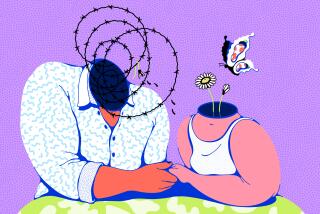Opinion: Are Hollywood movies teaching men and boys that predatory behavior is OK?
We’ve all sat in horror these last several months as some of the most influential and powerful men in the movie business have been accused of sexual abuse, harassment and assault. Yet, as a film buff, reading account after account of predatory men behind the scenes in Hollywood, it’s been impossible to ignore how similar the predatory behavior we’ve been reading about is to what often see celebrated on the big screen.
When it comes to sex and romance in the movies, male protagonists are rarely shown taking “no” for an answer. Persistence and dogged determination are almost universally depicted as admirable traits for leading men, especially when it comes to the pursuit of women. Heroic, nice-guy characters routinely engage in forms of coercion, manipulation or stalking. But instead of being framed as creepy, these behaviors, more often than not, are presented as effective and romantic ways to win over the women of their dreams.
We need to see depictions of men and boys who respect women’s boundaries and take ‘no’ for an answer.
In the latest James Bond movie, “Spectre,” 007 kills a man, shows up at his widow’s house, then aggressively forces himself on her sexually as she backs away in fear. Peter Parker stalks Gwen Stacy in both of “The Amazing Spider-Man” movies. And, in “Passengers,” Chris Pratt’s character is so obsessed with a sleeping woman he decides to trap her on a spaceship with him for the rest of her life. Despite their deplorable actions, these heroes eventually “get the girl.”
These examples are emblematic of an enduring pattern in Hollywood, wherein male protagonists are rewarded for ignoring the basic principles of sexual consent.
In light of rampant sexual harassment in the real world, it’s important to ask: Are Hollywood movies teaching men and boys that predatory behavior is OK?
Take actor Harrison Ford’s most iconic characters. Like many children of the 1980s, I idealized Han Solo, Indiana Jones and Rick Deckard. But upon rewatching Ford’s films as an adult, it’s hard to ignore that these characters are less than heroic in their treatment of women — and often act more like sexual predators.
Just watch the first kiss between Han Solo and Princess Leia in “The Empire Strikes Back.” Leia backs away from Han’s advances, saying no the entire time. Yet he ignores her verbal and nonverbal protests, pins her against the bulkhead and kisses her anyway. Similar scenarios play out in Indiana Jones movies. At the end of “The Temple of Doom,” Indy uses his whip to forcibly stop his leading lady from leaving in anger, pulls her back to him and kisses her. But far and away the most disturbing is the original “Blade Runner” from 1982 — where Ford’s character, Rick Deckard, slams the door closed to prevent his love interest from leaving his apartment, violently pushes her against a window, and sexually assaults her as romantic saxophone music plays in the background.
These scenes all send the same harmful messages — that women don’t really know what they want and that they secretly want powerful men to be aggressive toward them.
Once you start looking, you’ll notice this kind of non-consensual male behavior everywhere in popular culture. In classics such as “Say Anything,” “Groundhog Day” and the Oscar-winning “Dead Poets Society,” women are framed as challenges — puzzles to be solved or prizes to be won. When a woman says “no” in these stories, it actually means “maybe” or “keep trying.” When faced with rejection or disinterest, male protagonists simply stalk, pester or otherwise push women’s boundaries until their defenses are worn down.
Media are cyclical in that they reflect our culture and simultaneously shape it. Whether we want to admit it or not, we all learn a lot about the world around us (and what society expects of us) from the films and television shows we consume. This is especially true when it comes to ideas about love and relationships.
As we grapple with the long-overdue changes the #MeToo movement is bringing about in our society, men must begin the difficult process of transforming our own behavior and reevaluating our collective ideas about masculinity. Part of that process requires demanding that Hollywood stop presenting manipulative, coercive and non-consensual male behavior as suave and romantic. We need models of healthy romantic relationships in our entertainment. And we need to see depictions of men and boys who respect women’s boundaries, who engage in affirmative sexual consent, and who do, in fact, take “no” for an answer.
Jonathan McIntosh is a culture critic and filmmaker. His video essay project focusing on the intersections of masculinity, politics and entertainment can be viewed on the Pop Culture Detective YouTube channel.
Follow the Opinion section on Twitter @latimesopinion and Facebook
More to Read
A cure for the common opinion
Get thought-provoking perspectives with our weekly newsletter.
You may occasionally receive promotional content from the Los Angeles Times.










